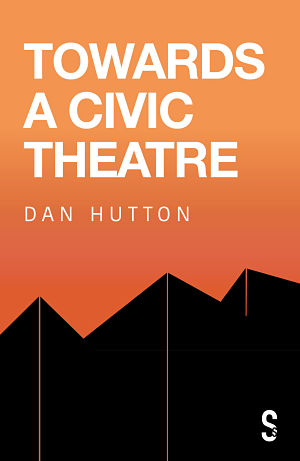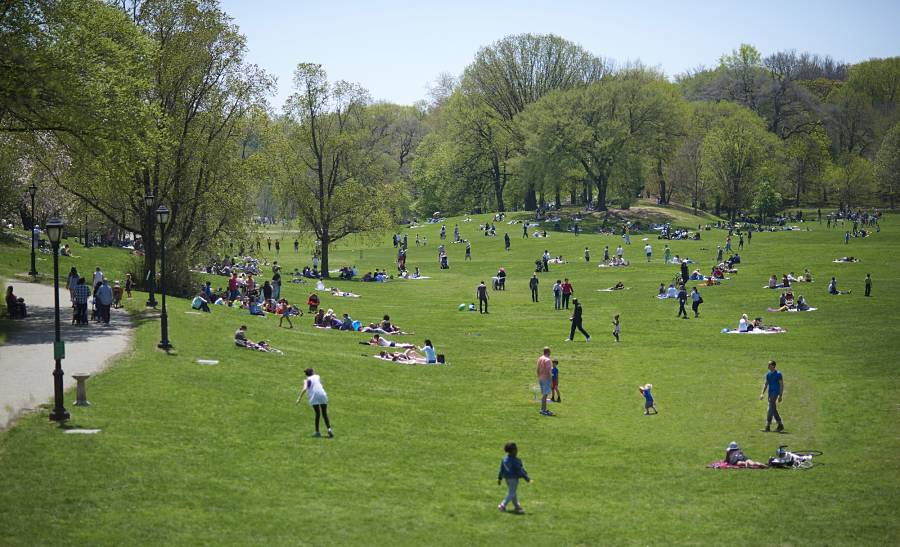The following is an edited excerpt from Towards a Civic Theater by Dan Hutton, published by Salamander Street and available online and in bookstores.
Summer 2020.
Two contrasting spaces.
One full of life. Another populated only by ghosts.
The first, packed with people and activity: exercise classes; birthday barbecues; parent-child science lessons. The second, full only with the promise of what might have been: laughter; tears; words; art. The former is a park. The latter a theatre. Both spaces for people to be together, with totally different demands placed on them in the wake of a deadly pandemic.
Public parks are amazing. They are spaces for hanging out, sharing gossip, reading books, popping corks, devouring picnics, exchanging knowledge, fighting power, walking dogs, kicking balls, running laps, playing games. They are places we can go to think, write, explore, rest, sit, sleep, walk. They are realms we have set aside, as a society, to be accessible for everyone, regardless of income and status, class and race, and are often dotted with benches, bins, gym equipment, flower beds, and playgrounds. When we were all forced to minimize interactions and stay at home for the literal good of our—and the country’s—health, they were places of sanctuary. From small urban enclaves to giant country reserves, parks really came into their own during 2020, affording us a communal space for our daily exercise, a place to meet friends at a distance, a window onto nature.
Theatres are also amazing. They are spaces for hanging out, sharing gossip, reading books, popping corks, devouring meals, exchanging knowledge, fighting power, hosting discussions, performing plays, watching shows. Theatres are places we can go to think, write, explore, rest, sit, argue, laugh, question. They are realms we have set aside to collectively imagine another world, to empathize with characters unlike ourselves, to come together as a community to be transported out of this life and into another. When we were all forced to minimize interactions and stay at home for the literal good of our—and the country’s—health, however, they became places of potential danger. The idea of sitting in the same dark room as hundreds of other people, breathing the same air and with limited exit routes, filled us with dread.
Parks are free to use. Theatres, by and large, are not.

Or rather, parks are free at the point of use. Because we all know that they’re not free free. Those borders don’t weed themselves, and the grass won’t magically halve its length every month or so. We know that they cost money to create and maintain, and that the funds to do so have to come from somewhere. We know, in the back of our minds, that if we pay our taxes, a very small amount of our contribution might go to the maintenance of parks. We also acknowledge that, should we travel to another part of the country, we may want to use another park whose local government we haven’t directly supported, but we can still make the most of that green open space. There’s a tacit agreement that, if someone can’t pay their taxes for whatever reason, they should still be allowed to use the park, subsidized ever-so-slightly by those who have paid into the collective pot.
In short, we have as a society come to the conclusion, consciously or otherwise, that investment in public parks is inherently a good thing: The purpose they serve is worth investing in for the benefit of all. Parks are civic spaces, relating to and defined by the town or city within which they are located. But they are also much more. They benefit all of us, and depend on the population to collectively take care of them.
In some theatres, on the other hand, we might be able to hang around for a few hours without feeling the need to buy a coffee. If we’re lucky, we could partake in a community workshop or two without forking out. But for the most part, if we want to engage in the output of the theatre in some way, we have to pay a ticket price, likely to cost anywhere between $10 and $200. This depends on who we are, where we sit, what we can afford, and to what extent the theatre is able to use creative budgeting to offset prohibitively expensive ticket prices. That may also be in addition to money we—or others—have already paid through tax or philanthropy. We silently agree that, if someone can’t afford a ticket for whatever reason, or is unable to access the building itself, they may not be able to engage with the work, irrespective of whether or not they’ve been paying into the aforementioned pot. That’s the luck of the draw, we think.
In short, we have come to the collective conclusion, consciously or otherwise, that investment in theatres is an inherently good thing—but only to an extent. Access to them comes with caveats, and they are only used by certain groups within the population, so they cannot be truly civic spaces. But they can benefit all of us, and depend on audiences to exist.
❦
Whatever your political persuasion or worldview, there’s one thing we can all agree on right now: The world is going through a period of, well, let’s say complication. Where I live, in the U.K., you might draw a line between the upheaval caused by the 2008 financial crisis, through a sustained period of austerity in the 2010s, followed by the rise in populism and anger experienced as a result of divisive referendums and elections, and the fallout, pain, and hardship caused by the coronavirus pandemic. In other parts of the world, there’s been the growing effects of the climate catastrophe, the rise of far-right nationalism, human rights abuses, and escalating tension among nuclear powers. Add to the mix a quite violent and sudden shift in our understanding of the self and community as a result of the extraordinary, expansive, and complicated networks which the internet has exploded into being, and you have a recipe for chaos and flux. It’s no wonder this is where we’ve ended up.
Theatre may not seem like a natural place to go in order to understand and counter these forces. In a world dominated by Netflix, Google, Facebook, Apple, Twitter, and any number of other online platforms, the idea of using theatre to drive change and inform our political life may seem naïve, even quaint.

But theatre offers something none of these platforms can: space. Physical, oxygen-filled, often actually concrete space, stuffed with living, thinking, breathing people. This is the basic fact Peter Brook recognized in the first two sentences of his seminal book The Empty Space: “I can take any empty space and call it a bare stage. A man walks across this empty space whilst someone else is watching him, and this is all that is needed for an act of theatre to be engaged.” Space is our secret weapon, and the way in which theatre changes lives, cities, states, countries, and continents. It is also, contrary to what Brook espouses, never “empty”—rather, as Ngũgĩ wa Thiong’o has pointed out, “It is always the site of physical, social, and psychic forces in society,” and thus often more or less welcoming to specific demographics. This same fact means it is also thick with stories, and ripe for exploiting at a civic level.
Theatre is not just about what happens on the stage. It’s about the greeting of friends with hugs and kisses beforehand, the hurried mumbling of your name as you collect your tickets at the box office, the quickly downed intermission drinks, the instant hush as the lights go up on the second act, the moment of union as we wash the play away with our applause, the sweary arguments in the bar afterwards. Away from the shows, it’s about the friendships and confidence built during youth theatre, the chuckles over coffee and cake in the café, the sighs at the guy who says, “It’s more of a comment than a question” at the post-show discussion. And for those making theatre, it’s also about the spirit of ensemble in the dressing rooms, the cooing over a set design model, the secrets told over morning coffee during rehearsals, the thrill and the tedium of tech week. Some of the most cherished moments of my life have been in a theatre, and every single one of them has been shared with many other people. Friends, colleagues, strangers.
Theatre, then, is a space for community. Always has been, always will be. It’s about being in a shared space with other people, as we all watch, create, or perform the same thing. The power of live theatre lies in this simple act and this joint contract. Some of us will sit in the dark as some more of us pretend to be other people on a lit stage. Those of us in the dark will be quiet and imagine that the characters the others are playing and the stories they are telling are real. Together, as a group, audiences and artists, we will conjure truth. It’s about sharing, and sharing requires empathy, so we can understand what our fellow humans want and need.
Given this, then, you might expect our theatres to be the most open and accessible spaces in a community, welcoming everybody with open arms and forever on the lookout for new ways to engage audiences, artists, and participants alike. You’d expect them to be spaces of pride, of community, without any barriers which shut people out. Unfortunately, this isn’t always the case.
So we must build a theatre which doesn’t exclude. A theatre which is kind and warm and generous. A theatre whose processes are a way of ensuring the art form’s centrality to the lives of a community whilst also tackling increased fragmentation, loneliness, and individualism.
Civic theatres should be deeply rooted in their community and local culture. They are ventures which put togetherness at the heart of their mission, using the communal act of being an audience watching a live performance to help achieve their goals. The very idea of private profit is refused and democratic structures are created within which administrators, artists and audiences can work collaboratively. The privileging of some groups above others should be anathema. They are local organizations which are at the same time international in outlook, and ensure sustainable processes are used so they can survive long into the future. They are, above all, places of leisure, but that doesn’t undermine the seriousness of their task. Yes, a “civic theatre” might sound like a thing of the past. But it’s time for us to reclaim it.
Dan Hutton is a theatre director, dramaturg, writer, and educator. He is a founding member of touring company Barrel Organ and has worked in theatres and arts venues across the United Kingdom. Time Out London described him as “one of our most promising young directors.”


